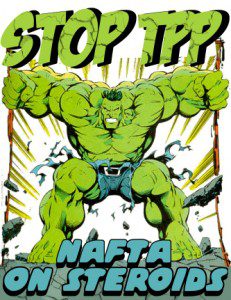 A new report from the Center for Economic and Policy Research (CEPR) finds that most U.S. workers would experience a net negative impact from the proposed Trans-Pacific Partnership (TPP) trade deal currently under negotiation. The paper, “Gains from Trade? The Net Effect of the Trans-Pacific Partnership Agreement on U.S. Wages,” by economist David Rosnick uses economic modeling results that are widely-cited by proponents of the agreement. These recent estimates of the U.S. economic gains that would result from the TPP are very small—only 0.13 percent of GDP by 2025. This paper finds that taking into account the effect of the agreement on wage inequality, the median wage earner would lose as a result of any such agreement.
A new report from the Center for Economic and Policy Research (CEPR) finds that most U.S. workers would experience a net negative impact from the proposed Trans-Pacific Partnership (TPP) trade deal currently under negotiation. The paper, “Gains from Trade? The Net Effect of the Trans-Pacific Partnership Agreement on U.S. Wages,” by economist David Rosnick uses economic modeling results that are widely-cited by proponents of the agreement. These recent estimates of the U.S. economic gains that would result from the TPP are very small—only 0.13 percent of GDP by 2025. This paper finds that taking into account the effect of the agreement on wage inequality, the median wage earner would lose as a result of any such agreement.
“Most U.S. workers are likely to lose out from the TPP,” CEPR Co-Director Mark Weisbrot said. “This may come as no surprise after 20 years of NAFTA and an even-longer period of trade policy designed to put lower- and middle-class workers in direct competition with low-paid workers in the developing world, but it’s still important to examine the economic projections.”
By examining economic modeling done by researchers Peter Petri, Michael Plummer, and Fan Zhai, the paper finds that “it would take only a very small contribution to inequality due to trade to wipe out all of the gains that most workers would get from this agreement.” Because of such an “un-equalizing effect of trade on wages” – and considering that the GDP gains are expected to be so small – the paper finds that the median wage earner in the U.S. will probably experience a net loss were the TPP to be implemented.
The paper’s author arrives at this conclusion by examining different projections for the effect of trade on inequality and concludes that “despite the very modest gains in expanded economic activity, wages will generally fall as a result of future trade agreements.”
The TPP is currently being negotiated among the U.S., Australia, Brunei Darussalam, Canada, Chile, Japan, Malaysia, Mexico, New Zealand, Peru, Singapore, and Vietnam. The text of the draft agreement has largely been kept secret, including from most legislators, but those who have seen it, such as Representative Alan Grayson (D – FL), have confirmed that it is modeled on NAFTA and similar U.S. trade agreements.


